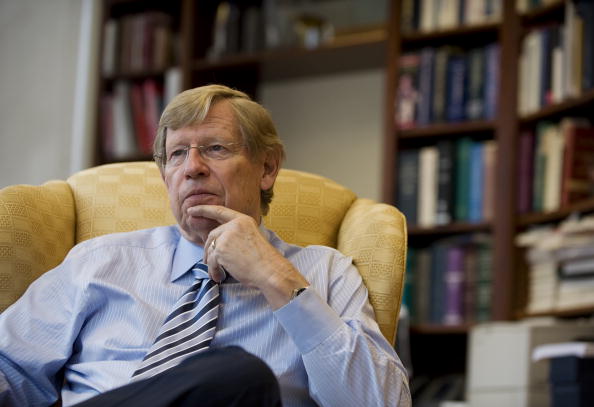
Airlines, hotels and tech leaders are among the 68 leading companies that on Friday filed a friend-of-the-Court brief opposing North Carolina’s law that requires individuals to use the bathroom that corresponds to their sex at birth.
Written by conservative legal dynamo Ted Olson, a veteran of Republican George W. Bush’s Administration, the filing urges the courts to strike down the North Carolina law as discriminatory and denies the legitimacy of transgender residents. The businesses assert that the bathroom provision runs counter to many of their non-discrimination policy and pro-diversity statements. Plus, they’re just bad for business and alienate LGBT customers and employees.
Among the companies signing the measure are American and United airlines, Hilton and Marriott hotels, and tech leaders Apple, Cisco, Dropbox, eBay, IBM and Microsoft. Big business has been vocal in opposition to such laws, and many firms have been successful in applying political pressure in places like Indiana and Alabama. But, to this point, they have been running into a wall against North Carolina’s law, known as House Bill 2, or HB2.
“HB2 is a law that forces transgender persons to deny, disclaim and conceal their gender identity, particularly whenever they wish to use single-sex restroom facilities on state or local government property,” said Olson, who represented Bush’s 2000 recount case and then his Justice Department before the Supreme Court. “In so doing, it forces transgender people to deny a fundamental feature of their character and personhood in the name of safety concerns that are wholly illusory and a slap in the face to all transgender persons who are simply trying to live their lives consistent with who they really are.”
That argument is key to the 44-page filing. “H.B. 2 discriminates against the roughly 44,000 transgender people in North Carolina by denying them access to single-sex facilities that accord with their gender identity but not their biological sex whenever they set foot in a facility owned or operated by any agency or arm of the State or a local government. In so doing, H.B. 2 sends a resounding message to the public that transgender persons—people simply trying to live their lives consistent with who they are—are ‘other’ and outcasts whose gender identity and human dignity are undeserving of recognition and respect on government property,” the companies write. “It is no accident that H.B. 2’s anti-transgender message and effects have prompted some commentators to coin it the most anti-LGBT legislation in the country.”
As Washington Bureau Chief Michael Scherer wrote in a TIME cover story in May, the question of bathrooms is one that transcends typical political divides, and one that has many Americans unsure just how they feel: “The 2016 battle over bathrooms is, after all, about far more than public facilities—it’s about gender roles, social change, federalism, physical danger, political polarization and, most strikingly, a breakdown in the ability of anyone in this country to speak across our divides, or appeal to common humanity.”
The U.S. Department of Justice has sued North Carolina over its bathroom bill, which also had sweeping impacts on minimum wage laws, civil rights protections for women and minorities, as well as people of faith. North Carolina Gov. Pat McCrory has tried to soften the political fallout, but activists have been relentless.
One study has estimated the North Carolina law has cost the economy $500 million and 1,750 jobs. Other studies have estimated the figures are lower, varying from $77 million to $200 million. Companies like PayPal and Deutsche Bank have scrapped plans to expand in the state, and the U.K. has warned its LGBT residents against visiting North Carolina.
Momentum is piling up against North Carolina, as is public opinion.
“The fact that Olson and so many leading American businesses have come together on this brief demonstrates the breadth and depth of opposition to legislation as illegal, unfair and dangerous as HB2,” said Chad Griffin, the president of the nation’s largest LGBT rights group, the Human Rights Campaign.
The Human Rights Campaign is clearly laying the groundwork for the law to find its way to the Supreme Court. Olson, who has argued 62 cases at the high court, is a masterful litigator and has taken on historic cases with LGBT rights in recent years. If this case makes its way to the Supreme Court, Olson’s brief is likely to be seen as a roadmap for overturning the law—especially if the court remains split 4-4.
More Must-Reads from TIME
- Why Trump’s Message Worked on Latino Men
- What Trump’s Win Could Mean for Housing
- The 100 Must-Read Books of 2024
- Sleep Doctors Share the 1 Tip That’s Changed Their Lives
- Column: Let’s Bring Back Romance
- What It’s Like to Have Long COVID As a Kid
- FX’s Say Nothing Is the Must-Watch Political Thriller of 2024
- Merle Bombardieri Is Helping People Make the Baby Decision
Write to Philip Elliott at philip.elliott@time.com